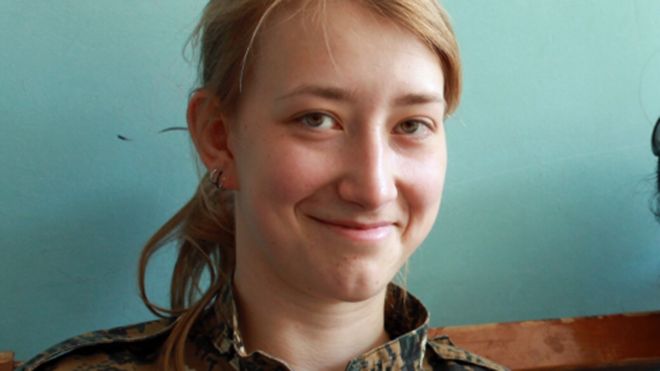LONDON — Many young people leading safe, comfortable lives in the West take up causes like the environment or gender equality. Fewer devote themselves to the plight of Kurds in Syria’s brutal civil war. Fewer still travel there to join the fighting, and those who do are usually men.
But Anna Campbell, a young woman from southern England, did all of that. Last week, as the Turkish military and its Syrian rebel allies hammered their way into Afrin, in northwestern Syria, Ms. Campbell died for her commitment — the eighth Briton and the first British woman to be killed fighting alongside Kurdish forces.
In Britain, Ms. Campbell, 26, was active in causes like animal rights and environmental protection, but until recently, she had no personal connection to the Kurds. Yet she was deeply moved, family and friends said, by the fight to defend an autonomous, mostly Kurdish region in northern Syria, known as Rojava, whose leaders advocate a secular, democratic and egalitarian politics, with equal rights for women.
“She was somebody who saw the injustices of the world and the plight of the weak and vulnerable and disempowered, and she also saw the idealism, the amazing utopian vision of Rojava, and she found those two elements irresistible,” her father, Dirk Campbell, said in an interview. “She wanted to prevent that from being stamped out, which Turkey and Syria are trying to do.”
The Free Syrian Army, a rebel group, and Turkey declared on Sunday that they had taken control of Afrin, a mostly Kurdish city near the Turkish border that had been held by the People’s Protection Units, the Kurdish-led militia known by the initials of its Kurdish name, Y.P.G. The Kurds appeared to have withdrawn, but the Y.P.G. claimed in a statement that the fight was not over, and that it had only shifted “from direct confrontation war to hit-and-run tactics.”
Ms. Campbell, whose mother died several years ago, grew up in East Sussex, in southeastern England. She studied at Sheffield University, but academics did not suit her, her father said, and she dropped out, worked as a blacksmith and trained as a plumber.
She traveled to Syria last year, received military and Kurdish-language training, and joined the Women’s Protection Units, or Y.P.J., the all-female military forces that fight alongside the Y.P.G. She dyed her blond hair black, to blend in better, and took a Kurdish name.
“I wanted to participate in the revolution of women that is being built up here and fight, and join also the weaponized fight against the forces of fascism and the enemies of the revolution,” she said in a video the Y.P.J. posted on Facebook on Monday. “And so now I’m very happy and proud to be going to Afrin to be able to do this.”
“She knew the risk she was facing,” said Ahed Elhendi, an adviser in Washington to the Syrian Democratic Council, the political group that controls northeast Syria and is allied with the Y.P.G. “When Afrin was being shelled by the Turkish Army, she asked to join the fight there many times until she finally made it there.”
Mr. Elhendi, who said he met Ms. Campbell last October in Syria, added, “We thought she could be a great asset to voice our dilemma, but her answer was always, she came for resistance, to fight.”
The Syrian war, now seven years old, features a complex array of forces. Kurdish-led militias, backed by the United States, are fighting another American ally, Turkey, which claims that the Y.P.G. is an extension of a Kurdish insurgent group, the Kurdistan Workers’ Party, also known as the P.K.K., that has been labeled a terrorist organization.
The Kurds are also fighting the Syrian government of President Bashar al-Assad, which is backed by Russia, Iran and Iranian-sponsored Shiite militias, and has increasingly reasserted control over the country.
Each of those factions has, to varying degrees, also fought the Islamic State group, now all but eliminated as a military force in Syria. And other rebel groups round out the picture, including Sunni Islamists who oppose all the major parties.
Mr. Campbell, 67, a musician, said he tried to talk his daughter out of going to Syria, knowing that she could be hurt or killed. “In retrospect, I could have made the argument more forcefully, but I think she would have dug her heels in even harder,” he said.
“I knew she was tough, but I never saw her as pointing a gun,” said Mr. Campbell, who learned of his daughter’s death on Sunday. “Now the bottom has dropped out of my world.”

